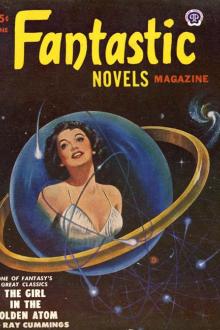Genre Romance. Page - 15

e a real getaway. All I needed to lay hands on him was a good description."
"Description?" echoed Whipple. "Your agency's got descriptions on file--thumb prints--photographs--of every employee of this bank."
"Every one of 'em but Clayte," I said. "When I came to look up the files, there wasn't a thing on him. Don't think I ever laid eyes on the man myself."
A description of Edward Clayte? Every man at the table--even old Sillsbee--sat up and opened his mouth to give one; but Knapp beat them to it, with,
"Clayte's worked in this bank eight years. We all know him. You can get just as many good descriptions as there are people on our payroll or directors in this room--and plenty more at the St. Dunstan, I'll be bound."
"You think so?" I said wearily. "I have not been idle, gentlemen; I have interviewed his associates. Listen to this; it is a composite of the best I've been able to get." I read: "Edward Clayte; height about five feet seven or eight; weight between one hundred an

ph passed outfit after outfit exhausted by the way. He had reachedCopper Creek Camp, which was boiling and frothing with the excitement ofgold-maddened men, and was congratulating himself that he would soon beat the camps west of the Peace, when the thing happened. A drunkenIrishman, filled with a grim and unfortunate sense of humor, spotted ShanTung's wonderful cue and coveted it. Wherefore there followed a bit ofexcitement in which Shan Tung passed into his empyrean home with a bulletthrough his heart, and the drunken Irishman was strung up for his misdeedfifteen minutes later. Tao, the Great Dane, was taken by the leader ofthe men who pulled on the rope. Tao's new master was a "drifter," and ashe drifted, his face was always set to the north, until at last a newhumor struck him and he turned eastward to the Mackenzie. As the seasonspassed, Tao found mates along the way and left a string of his progenybehind him, and he had new masters, one after another, until he was grownold and his muzzle w

in the morning we go to the pump-room (though neither my master nor I drink the waters); after breakfast we saunter on the parades, or play a game at billiards; at night we dance; but damn the place, I'm tired of it: their regular hours stupify me--not a fiddle nor a card after eleven!--However, Mr. Faulkland's gentleman and I keep it up a little in private parties;--I'll introduce you there, Thomas--you'll like him much.
THOMAS Sure I know Mr. Du-Peigne--you know his master is to marry Madam Julia.
FAG I had forgot.--But, Thomas, you must polish a little--indeed you must.--Here now--this wig!--What the devil do you do with a wig, Thomas?--None of the London whips of any degree of ton wear wigs now.
THOMAS More's the pity! more's the pity! I say.--Odd's life! when I heard how the lawyers and doctors had took to their own hair, I thought how 'twould go next:--odd rabbit it! when the fashion had got foot on the bar, I guessed 'twould mount to the box!--but 'tis all out of character

theories. What I saw through that ultramicroscope was not an unproven theory, but a fact. My theories you have brought out by your questions."
"You are quite right," said the Doctor; "but you did mention yourself that you hoped to provide proof."
The Chemist hesitated a moment, then made his decision. "I will tell you the rest," he said.
"After the destruction of the microscope, I was quite at a loss how to proceed. I thought about the problem for many weeks. Finally I decided to work along another altogether different line--a theory about which I am surprised you have not already questioned me."
He paused, but no one spoke.
"I am hardly ready with proof to-night," he resumed after a moment. "Will you all take dinner with me here at the club one week from to-night?" He read affirmation in the glance of each.
"Good. That's settled," he said, rising. "At seven, then."
"But what was the theory you expected us to question you about?" asked the Very Young Man.

Tower, Morgan discovered that he had saved as much money for his old age as a sensible man could want; that he was tired of the active pursuit--or, as he termed it, of the dignified quackery of his profession; and that it was only common charity to give his invalid brother a companion who could physic him for nothing, and so prevent him from getting rid of his money in the worst of all possible ways, by wasting it on doctors' bills. In a week after Morgan had arrived at these conclusions, he was settled at The Glen Tower; and from that time, opposite as their characters were, my two elder brothers lived together in their lonely retreat, thoroughly understanding, and, in their very different ways, heartily loving one another.
Many years passed before I, the youngest of the three--christened by the unmelodious name of Griffith--found my way, in my turn, to the dreary old house, and the sheltering quiet of the Welsh hills. My career in life had led me away from my brothers; and even now, when we are all u

never eat more than anomelette and some fruit for luncheon, compelled to sit down every day toa mittagessen! I wonder I have any digestion left at all."
"Do you mean that you were there under your own name?" he askedincredulously.
She shook her head.
"I secured some perfectly good testimonials before I left," she said."They referred to a Miss Brown, the daughter of Prebendary Brown. I wasMiss Brown."
"Great Heavens!" Nigel muttered under his breath. "You heard aboutAtcheson?"
She nodded.
"Poor fellow, they got him all right. You talk about thrills, Nigel,"she went on. "Do you know that the last night before I left for myvacation, I actually heard that fat old Essendorf chuckling with hiswife about how his clever police had laid an English spy by the heels,and telling her, also, of the papers which they had discovered andhanded over. All the time the real dispatch, written by Atcheson whenhe was dying, was sewn into my corsets. How's that for an excitingsituation?"

said--" only every winter it was a different "he."
In my wash-stand drawer I'd kept all the clippings about her coming out and the winter she spent in Washington and was supposed to be engaged to the president's son, and the magazine article that told how Mr. Jennings had got his money by robbing widows and orphans, and showed the little frame house where Miss Patty was born--as if she's had anything to do with it. And so now I was cutting out the picture of her and the prince and the article underneath which told how many castles she'd have, and I don't mind saying I was sniffling a little bit, for I couldn't get used to the idea. And suddenly the door closed softly and there was a rustle behind me. When I turned it was Miss Patty herself. She saw the clipping immediately, and stopped just inside the door.
"YOU, TOO," she said. "And we've come all this distance to get away from just that."
"Well, I shan't talk about it," I replied, not holding out my hand, for with her, so to speak, next

daub on the easel.
"Ask him, then, if he would not like to learn French."
"To learn French?"
"To take lessons."
"To take lessons, my daughter? From thee?"
"From you!"
"From me, my child? How should I give lessons?"
"Pas de raisons! Ask him immediately!" said Mademoiselle Noemie, with soft brevity.
M. Nioche stood aghast, but under his daughter's eye he collected his wits, and, doing his best to assume an agreeable smile, he executed her commands. "Would it please you to receive instruction in our beautiful language?" he inquired, with an appealing quaver.
"To study French?" asked Newman, staring.
M. Nioche pressed his finger-tips together and slowly raised his shoulders. "A little conversation!"
"Conversation--that's it!" murmured Mademoiselle Noemie, who had caught the word. "The conversation of the best society."
"Our French conversation is famous, you know," M. Nioche ventured to continue. "It's a great talent."
"But

ture upon his dome as well as the colour decorations!"
"'Tis true, my ancient?" another asked of me.
I made no repartee, continuing to sit with my chin dependent upon my cravat, but with things not the same in my heart as formerly to the arrival of that grey pongee, the grey glove, and the beautiful voice.
Since King Charles the Mad, in Paris no one has been completely free from lunacy while the spring-time is happening. There is something in the sun and the banks of the Seine. The Parisians drink sweet and fruity champagne because the good wines are already in their veins. These Parisians are born intoxicated and remain so; it is not fair play to require them to be like other human people. Their deepest feeling is for the arts; and, as everyone had declared, they are farceurs in their tragedies, tragic in their comedies. They prepare the last epigram in the tumbril; they drown themselves with enthusiasm about the alliance with Russia. In death they are witty; in war they have poetic spas
